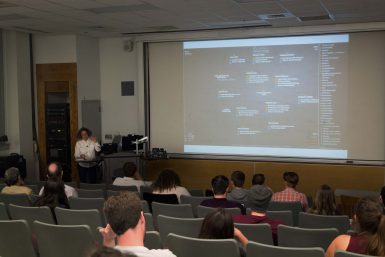Sawyer lecturer talks about covering revolution through non-narrative format

At about 3,500 miles away, documentary filmmaker Alisa Lebow found herself thinking about the revolution in Egypt. As she watched the events unfold before her eyes on the news, it didn’t take her long to realize this would be her next project.
However, she encountered one major problem: No one wanted to make films about the revolution.
Understanding the hesitancy among Egyptian filmmakers, Lebow said she knew she too should approach the topic with caution. So, instead of the traditional narrative form of documentary filmmaking, she made an interactive documentary. Called Filming Revolution, the interactive documentary contained all the interviews, files and materials collected during her time reporting in Egypt.
“The interviewees themselves were speaking against closed narrative, so it only made sense to find a form that can work,” Lebow said.
Lebow, a reader in film studies at the University of Sussex, lectured Thursday as part of the Center for Documentary Research and Practice’s annual Sawyer Seminar, this year focused on documentary media and historical transformations. Her lecture was titled, “Filming Revolution and the Non-Narrative Poetics of Discourse.”
Lebow is the author of First Person Jewish and The Cinema of Me: The Self and Subjectivity in First Person Documentary. She also co-directed, wrote and starred in the first-person documentary Treyf from 1998, which chronicled the life of herself and Cynthia Madansky as Jewish lesbians.
Instead of going to Egypt right after the August 2013 Rabaa massacre, which resulted in more than 800 deaths, Lebow waited until after the departure of the media crews and closer to the 2014 elections.
“It turned out to be a great time to reflect on what happened,” Lebow said.
Throughout her various interviews with Egyptian filmmakers, all with strong opinions on what happened during this period, she learned more and more about how the people of Egypt are trying to combat the atrocities without even having to use film.
“This wasn’t a project about activism, but it certainly comes up,” Lebow said.
One filmmaker, Nadine Khan, was asked to make a short film about the revolution for Cannes. The final project, I Will Speak of the Revolution, turned out to be merely footage of feet on the ground accompanied with narration on how Khan will not speak about the revolution. The point of this project was that no film should be made about the revolution, an idea observed by many Lebow interviewed.
Other projects like Khalid Abdalla and Aida El-Kashef’s The Square and Yasmin Elayat’s 18 Days in Egypt are also featured on the Filming Revolution website.
This form is one way in which she encourages others to step away from linear and traditional storytelling. She says her inspirations for this piece came from the City Symphonies of the 1920s, the 1929 Soviet art documentary The Man with the Movie Camera and the prospect of “chaosmos” – working with systems that don’t necessarily close possibilities, but open them – from Italian writer Umberto Eco.
Despite the dominant presence of abstract ideas in this piece, Lebow said she believes there is still a story to be found here. She thinks it would be practically impossible to make a film otherwise.
“If you want to make a documentary, you have to get on that storytelling bandwagon,” Lebow said.
At one point during the lecture, Lebow cited a quote from French art filmmaker Jean-Luc Godard that further emphasized her non-linear style: “A story should have a beginning, a middle and an end, but not necessarily in that order.”
While Lebow said she thinks the quote would mostly be true for theatrical documentary films, the haphazard nature of an interactive documentary – the viewers can choose to start or finish wherever they please – complements Godard’s idea well. Lebow is not the first documentarian to dabble in this style, though she could introduce it to a whole generation of aspiring filmmakers.
“I think a story emerges,” Lebow said. “It doesn’t need to make sense.”

